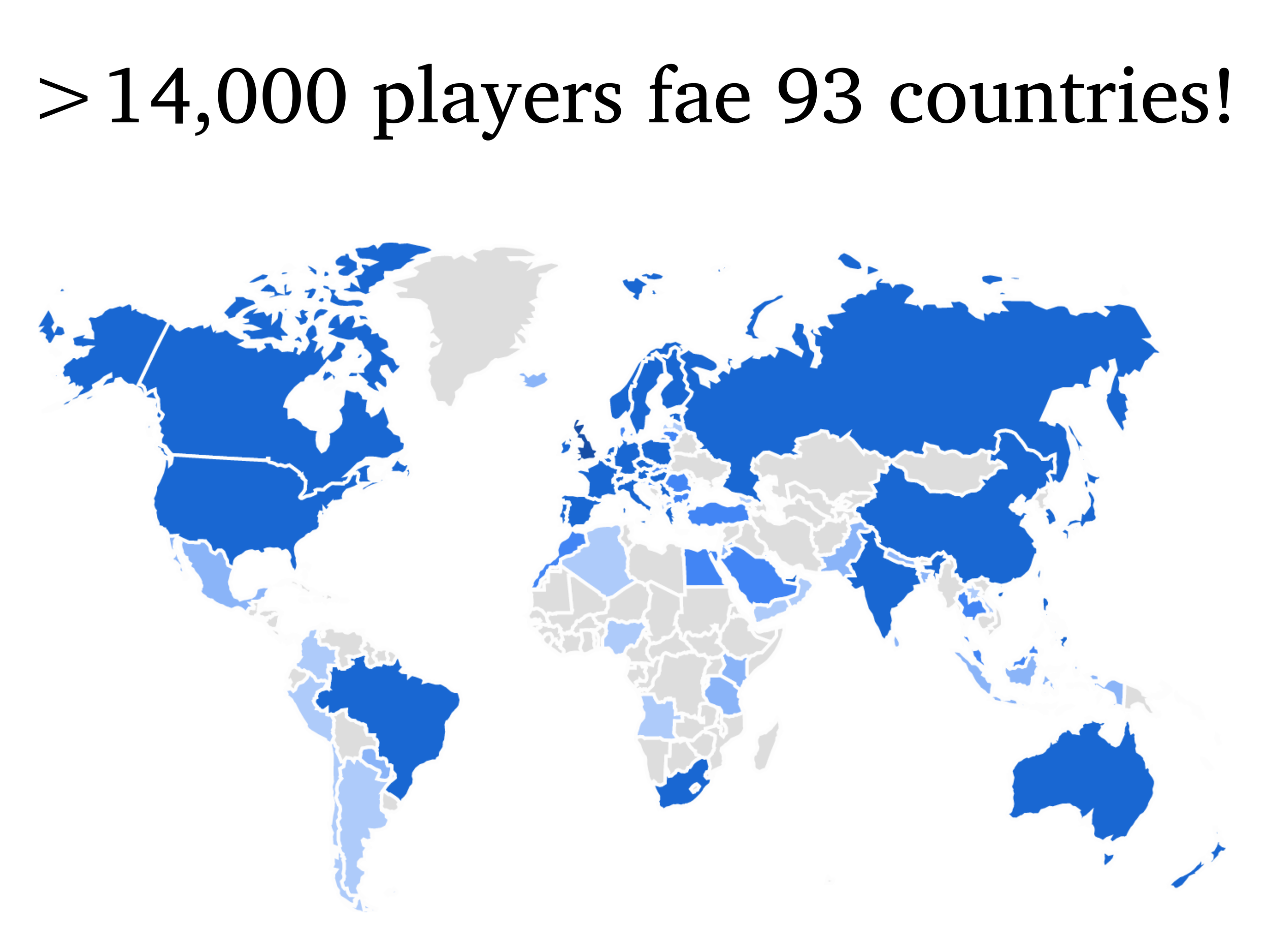Wirdle solutions week 13
W'ir blyde tae announce dat, as o daday, da Shaetlan Wirdle is haed mair as 13,000 players fae 93 countries. Here's da solutions fir dis week! Scroll fir ee wird at a time tae git da richt answer, it's meaneen, an da history o da wird. Last you'll fin da main references at we øse fir da etymologies, an da latest map o players. You'll fin da priciples o wir spelleen system at https://www.iheardee.com/shaetlan/spellin-in-shaetlan (or inna wir linktree).
✅
Hit's important tae mind at "Aald English" wis nivver a monolithic language, reider hit's a cover term fir fower distinct Nort Sea Germanic varieties. Da direct ancestor tae Scots wis Northumbrian Aald English. Da direct ancestor tae English wis Mercian Old English. But maist o whit data is left comes fae Wast Saxon Aald English. Wharivver possible w'ir gien da Northumbrian Aald English forms, seein as da main ancestors tae Shaetlan is Norn an Scots (no English), wi a lok o Dutch/Low German influence.
✅
Wir tanks agein tae Julie fir tinkin up da idee, an tae Andrew fir makkin it possible! 🤗
snush ‘to sniff, snort’
History: dis wird is onny fun in Orkney an Shetland. Da origin o da Scandinavian cognates (No. & Da. snuse, Sw. snusa ‘tae sniff’) is laekly fae Low Germanic (cf. Aald Dutch snoesen) so dis is maebbi a Hansa lonn. Da Ultimate origin is da Proto-Germanic *snūtaz ‘snoot, trønnie’.
rodds plural of rodd ‘road’
History: da Aald Scots rod(d) ‘gaet, track, rodd’ is attestit fae 1231. W’r no sure o da origin, but hit ultimately micht’ll a haed da sam origin as da Aald Scots rade ‘a foray’, at decends fae Aald English, road, raat ‘vaige, run; raid, expedeetion’. Dis in turn cam fae da Proto-Germanic *raidō ‘run, vaige’ at ultimately comes fae Proto-Indo-European *Hreydʰ- ‘tae ging on a journey, be movin’. Da semantic development fae ‘vaige, run’ tae ‘track, wye, rodd’ is a bit o a mystery.
steek ‘connekin loop; tae shut, (en)close, block’
History: da Aald Scots steik ‘tae stitch’ is attestit fae 1502 an decends fae (N) Aald English stice ‘a stitch’, at itsel comes fae Proto-Germanic *stikiz ‘a stickeen, a prick’ an ultimately fae Proto-Indo-European *(s)teyg- ‘tae be sharp, tae swee’. Da Aald Scots verb steke ‘tae block, obstruct’ (attestit fae 1375) is a bit o a mystery. Hit maebbi haes da sam origin as stick, fae Aald English sticca ‘rod, twig’ (ultimately fae da sam Proto-Indo-European røt), wi da oreeginal notion o slidin a snibbi troo a steeple or somethin laek dat.
mesel ‘myself’ (1st singular reflexive pronoun)
History: reflexive pronouns indicates a entity at’s identical wi somethin at’s alrediy bøn mentioned idda sentence. Shaetlan haes twa kinds o reflexive pronouns, a emphatic een, at’s a compound o me +self fir da first person singular, an a unstressed een, at’s jüst me fir da first person singular. Da nort and Scots forms shaas da oreeginal OE mē se(o)lf, at wis dan reanalysed laetter tae my + self idda sooth varieties athin Middle English.
saets plural of saet ‘seat’
History: dis is a airly lonn fae da Aald Norse sǽti ‘saet’. Aald Scots haed seit(t), seytte, sa(i)t(t)(e). Da wird ultimately comes fae Proto-Indo-European *sēd-i̯o-, a nominal derivation o *sed- ‘tae sit’.
bruck ‘rubbish’
History: da Aald Scots bro(a)k ‘brokken or smaa pieces, ormals’ is attestit fae 1538 an derives fae Aald English broc ‘misery’, gebroc ‘fragment’, at’s nominal derivations o brecan ‘tae brak’. Yun in turn comes fae Proto-Germanic *brekaną ‘tae brak’, ultimately fae Proto-Indo-European *bʰreg- ‘break’.
wirry ‘to worry; shock’
History: da Aald Scots wery is attestit fae 1400 wi da meaneen ‘tae trottle’ an fae 1420 wi da meaneen ‘tae be shockit’ Hit comes fae da Aald English wyrgan ‘tae trottle, wirry, kill trowe violence’, at comes fae da Proto-Germanic *wurgjan meanin da sam. Hit ultimately gings back tae Proto-Indo-European *wergh- ‘bind, squeeze’. Da form worry (wi a back roonded o- or u- soond) onny cam efter in English startin idda 1500s.
References
Bokmålsordboka. 2022. Språkrådet og Universitetet i Bergen. Available at http://ordbøkene.no.
Christie-Johnston, Alastair & Adaline Christie-Johnston. 2014. Shetland words. A dictionary of the Shetland dialect. Lerwick: The Shetland Times.
de Vaan, Michiel. 2008. Etymological dictionary of Latin and the other Italic languages. Leiden, Boston: Brill
de Vries, Jan. 1977. Altnordisches etymologisches Wörterbuch. Leiden: Brill.
DSL Online. 2002. Glasgow: The University of Glasgow. Available at https://dsl.ac.uk/.
Heggestad, Leiv, Finn Hødnebø & Erik Simensen. 1993. Norrøn ordbok. 4th edn of Gamalnorsk ordbok. Oslo: Det norske samlaget.
Hellquist, Elof. 1993. Svensk etymologisk ordbok. 3rd edn. 2 Vols. Malmö: Gleerups.
Jakobsen, Jakob. 1985 [1928]. An etymological dictionary of the Norn language in Shetland. Lerwick: The Shetland Times.
Kroonen, Guus. 2013. Etymological dictionary of Proto-Germanic. Leiden: Brill.
Lehmann, Winfred P. 1986. A Gothic etymological dictionary. Leiden: Brill.
Macbain, Alexander. 1911. An etymological dictionary of the Gaelic language. Stirling: Eneas Mackay.
Marwick, Hugh. 1929. The Orkney Norn. Oxford: Oxford University Press.
Matasović, Ranko. 2009. Etymological dictionary of Proto-Celtic. Leiden: Brill.
Nielsen, Niels Åge. 1995. Dansk etymologisk ordbog. Ordenes historie. 4th edn. København: Gyldendal.
Nynorskordboka. 2022. Språkrådet og Universitetet i Bergen. Available at http://ordbøkene.no.
OED Online. 2021. Oxford: Oxford University Press. Available at https://www-oed-com.ezproxy.uni-giessen.de.
Orel, Vladimir. 2003. A handbook of Germanic etymology. Leiden: Brill.
Pfeifer, Wolfgang (ed.). 1997. Etymologisches Wörterbuch des Deutschen. München: Deutscher Taschenbuch Verlag.
Pokorny, Julius. 1994. Indogermanisches etymologisches Wörterbuch. 3rd edn. 2 Vols. Tübingen: Francke Verlag.
Torp, Alf. 1919. Nynorsk etymologisk ordbok. Kristiania: Forlaget H. Aschehoug & Co.
Zoëga, Geir T. 1896. English-Icelandic dictionary. Reykjavík: Sigurður Kristjánsson.
Zoëga, Geir T. 1922. Icelandic-English dictionary. 2nd edn, enlarged. Reykjavík: Sigurður Kristjánsson.

